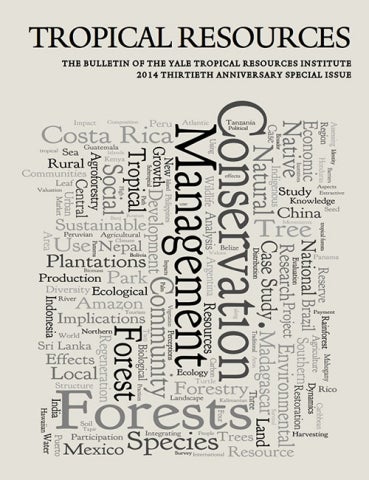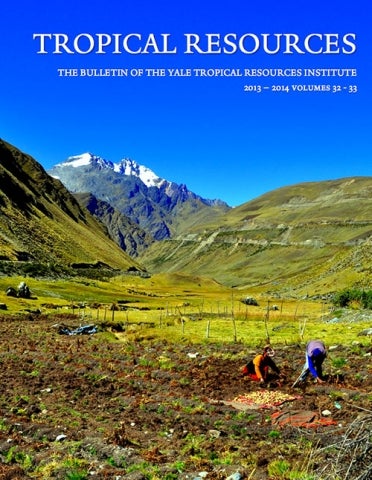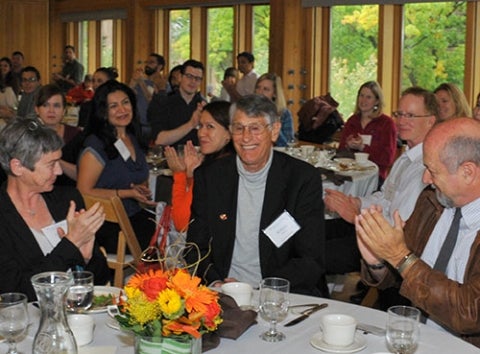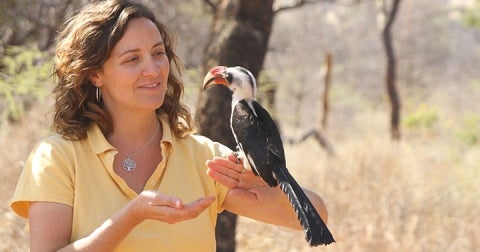Note: Yale School of the Environment (YSE) was formerly known as the Yale School of Forestry & Environmental Studies (F&ES). News articles and events posted prior to July 1, 2020 refer to the School's name at that time.
 The 30th anniversary Special Issue of <em>Tropical Resources</em>
The 30th anniversary Special Issue of <em>Tropical Resources</em>
The F&ES-based Tropical Resources Institute (TRI) this month published a Special Issue that highlights three decades of student work in commemoration of the organization’s 30th anniversary.
The Special Issue features 19 articles that were previously published in Tropical Resources, TRI’s annual publication, or its predecessor, TRI News.
In an introductory article, William “Bill” Burch, the Frederick C. Hixon Professor Emeritus of Natural Resources Management at F&ES and TRI’s founding director, reflects on the organization's founding — and the people who have made it a landmark program in conservation training.
“We… went about creating a truly global TRI program with an international advisory committee, linkages to other international programs, improved course offerings from experts in tropical affairs and a whole turning of the effort toward conservation and development that included the skills and needs of local tropical forest communities,” Burch writes. “There was ample room for pure science but the central tendency of the program was on conserving of the people and forests in the tropics.”
Since its inception in 1984, TRI has sponsored more than 600 TRI Fellows and their student research projects, and helped them publish their scholarly work in Tropical Resources and other academic journals.
The Special Issue features 19 articles that were previously published in Tropical Resources, TRI’s annual publication, or its predecessor, TRI News.
In an introductory article, William “Bill” Burch, the Frederick C. Hixon Professor Emeritus of Natural Resources Management at F&ES and TRI’s founding director, reflects on the organization's founding — and the people who have made it a landmark program in conservation training.
“We… went about creating a truly global TRI program with an international advisory committee, linkages to other international programs, improved course offerings from experts in tropical affairs and a whole turning of the effort toward conservation and development that included the skills and needs of local tropical forest communities,” Burch writes. “There was ample room for pure science but the central tendency of the program was on conserving of the people and forests in the tropics.”
Since its inception in 1984, TRI has sponsored more than 600 TRI Fellows and their student research projects, and helped them publish their scholarly work in Tropical Resources and other academic journals.
 <em>Tropical Resources</em>, 2013 – 2014 volumes 32 - 33
<em>Tropical Resources</em>, 2013 – 2014 volumes 32 - 33
TRI also recently published a double-issue of Tropical Resources featuring research articles by 15 TRI Fellows who conducted fieldwork in 2012 and 2013. The papers draw on research conducted across Africa, Asia, and Latin America.
“We are very excited to be publishing these two important volumes this year,” said Simon Queenborough, TRI’s Director. “The Special Issue demonstrates the real-world effect that our current TRI Fellows publishing now can hope to have. Many previous fellows reprinted in the Special Issue have had and continue to have great success in academia, conservation and development, solving problems of tropical forests and addressing the concerns of the communities that live and work in them. We are looking forward to 30 more years.”
Tropical Resources: the Bulletin of the Yale Tropical Resources Institute, is published annually by TRI. It features articles from TRI Fellows, as well as occasional articles from other tropical researchers. It is available on the TRI website or hard copy by request.
“We are very excited to be publishing these two important volumes this year,” said Simon Queenborough, TRI’s Director. “The Special Issue demonstrates the real-world effect that our current TRI Fellows publishing now can hope to have. Many previous fellows reprinted in the Special Issue have had and continue to have great success in academia, conservation and development, solving problems of tropical forests and addressing the concerns of the communities that live and work in them. We are looking forward to 30 more years.”
Tropical Resources: the Bulletin of the Yale Tropical Resources Institute, is published annually by TRI. It features articles from TRI Fellows, as well as occasional articles from other tropical researchers. It is available on the TRI website or hard copy by request.
Queenborough Takes Lead at TRI
 Earlier this year, <strong>Simon Queenborough</strong> took over leadership as the new Musser Director of the Tropical Resources Institute. <a href="http://environment.yale.edu/news/article/simon-queenborough-TRI-director/">In an interview</a>, he describes what drew him into the field of tropical forestry, the greatest challenges facing the planet’s tropical areas, and how TRI can make a difference. <a href="http://environment.yale.edu/news/article/simon-queenborough-TRI-director/">Read more</a>
Earlier this year, <strong>Simon Queenborough</strong> took over leadership as the new Musser Director of the Tropical Resources Institute. <a href="http://environment.yale.edu/news/article/simon-queenborough-TRI-director/">In an interview</a>, he describes what drew him into the field of tropical forestry, the greatest challenges facing the planet’s tropical areas, and how TRI can make a difference. <a href="http://environment.yale.edu/news/article/simon-queenborough-TRI-director/">Read more</a>
New Burch Prize for TRI Research
 In October, F&ES <a href="http://environment.yale.edu/news/article/fes-creates-william-burch-prize-to-honor-student-research-at-tri/">announced the creation</a> of a new student award, the <b>William R. Burch Prize</b>, which is named in honor of the founder of the School’s influential Tropical Resources Institute. Beginning in 2015, the $1,000 cash prize will be awarded annually to the best paper written by a TRI Fellow.
In October, F&ES <a href="http://environment.yale.edu/news/article/fes-creates-william-burch-prize-to-honor-student-research-at-tri/">announced the creation</a> of a new student award, the <b>William R. Burch Prize</b>, which is named in honor of the founder of the School’s influential Tropical Resources Institute. Beginning in 2015, the $1,000 cash prize will be awarded annually to the best paper written by a TRI Fellow.
The Tropical Resources Institute: Three Decades of Global Impact
 In the last three decades, the <strong>Tropical Resources Institute</strong> has sponsored more than 600 Fellows and their student research projects, helping to launch hundreds of careers in tropical forestry across the planet. We asked several distinguished alums to recollect the work they did while they were here, share what they're doing today, and reflect on how their experiences with TRI changed their lives. <a href="http://environment.yale.edu/news/article/alumni-reflect-on-30-years-of-tropical-resources-institute/">Read more</a>
In the last three decades, the <strong>Tropical Resources Institute</strong> has sponsored more than 600 Fellows and their student research projects, helping to launch hundreds of careers in tropical forestry across the planet. We asked several distinguished alums to recollect the work they did while they were here, share what they're doing today, and reflect on how their experiences with TRI changed their lives. <a href="http://environment.yale.edu/news/article/alumni-reflect-on-30-years-of-tropical-resources-institute/">Read more</a>
– Kevin Dennehy kevin.dennehy@yale.edu 203 436-4842
Published
December 17, 2014